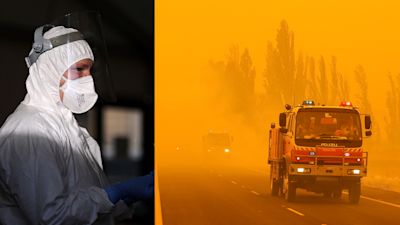How the climate crisis continued in 2020 while coronavirus dominated the headlines

Across the world the coronavirus crisis took over the news headlines during 2020, pushing the climate crisis to one side.
The rapid impact of climate change has not, however, gone away.
Global temperatures have continued to rise, deforestation has accelerated, and extreme weather patterns caused death and destruction.
Here are the milestone moments from 2020.
January
The year started with the bleak news that the world had recorded its hottest January on record.
Severe drought and heat led to fierce wildfires in Australia which scorched more than 46 million acres of land, an estimated three billion animals were affected by the destruction.
February
Antarctica recorded its warmest day on record. Temperatures on the continent rose to 18.3C (64.94F) - a new high for one of the fastest warming regions on earth.
Closer to home, the UK recorded its wettest February on record devastating communities left flooded.
March
As major cities around the world went into lockdown, CO2 emissions and pollution dropped in March. But not enough to reverse the decades of rising levels.
March 2020 was the second hottest March on record.
April
April 2020 was the sunniest April on record for the UK.
It was also announced in April that the Cop26 international climate talks due to be held in the UK in November were to be postponed until 2021.
May
An ITV News investigation uncovered the acceleration of deforestation in the Amazon during the pandemic, with illegal loggers making the most of authorities in lockdown.
Meanwhile the UK had its driest May on record, while the the world experienced its hottest May ever.
The highest levels of CO2 were recorded in 2.6 million years during June, and the Arctic saw a heatwave - with temperatures soaring to 38C.
July
In the Arctic, an area half the size of Finland melted in a single day as ice melt records were exceeded once more.
The Northern Hemisphere reported its hottest July on record - while it was the second hottest month on record globally.
August
A busy month with extreme weather seen across the globe.
Record breaking heat contributed to huge wildfires on the West coast of the USA - California battled against the out of control blaze for weeks.
San Francisco was bathed in orange haze from the smoke.
India saw its heaviest monsoon rains in 47 years with extensive flash flooding in some of the country's major cities. Europe too battled against flood waters with heavy rainfall across the continent.
Japan, Paraguay, and western Australia all reported record breaking temperatures for the time of year.
Mauritius declared a "state of environmental emergency" after a run aground ship spilled tons of fuel in the turquoise waters off the country's coast.
September
Across the globe, this September was the hottest on record.
The World Wide Fund for Nature (WWF) issued a report warning wildlife populations are in "freefall," having declined by more than two-thirds in less than 50 years.
Climate crisis action group Extinction Rebellion (XR) blockaded two of News Corporation’s major printing presses in the UK.
The group said it was using the disruption to expose the newspapers’ "failure to report on the climate & ecological emergency".
October
A delayed ban on plastic straws, stirrers and cotton buds comes into force in the UK as part of efforts to tackle single-use plastic pollution.
Weather warnings for rain returned to the UK - the most severe since March - with many communities left flooded, again.
November
Latest figures from the World Meteorological Organisation (WMO) showed Covid lockdowns around the world had not curbed record high levels of carbon dioxide in the atmosphere in 2020.
ITV News shared the desperate story of a herd of wild elephants forced to find food among a landfill site in Sri Lanka - the result of the loss of their natural habitat.
December
Initial data from seasonal temperature models suggest temperatures for the month have been warmer than average in the UK.
It comes as Boris Johnson announced a new target to cut the country's emissions by at least 68% by 2030 - a move that environmental groups said needed to be backed up with policies and action.
Elsewhere official data showed deforestation and fires in Brazil's Amazon hit their highest levels in 12 years.